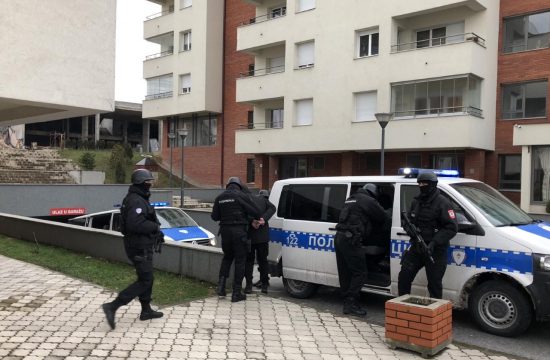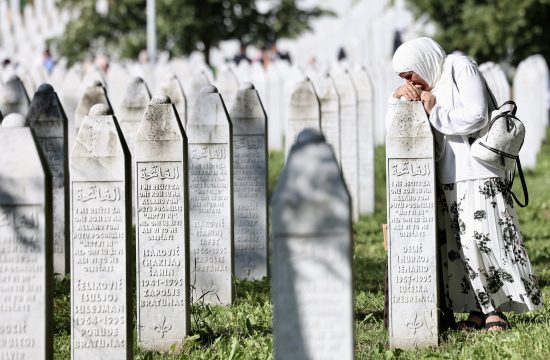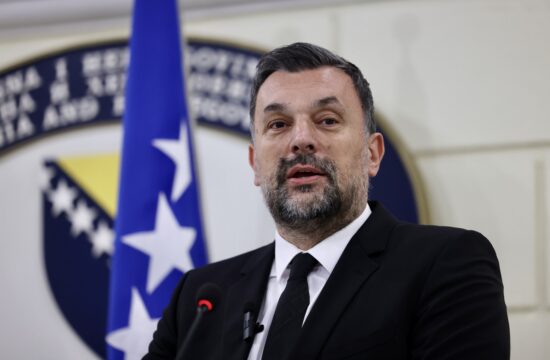Clutching to a pair of boots he was wearing when he was fleeing the forest where 23 years ago his father, cousins and his friends were killed, Mefail Dudic gazed through the dense trees, remembering the ordeal that had turned the name of his town of Srebrenica into a synonym for genocide.
“I keep them as if they were made of gold,” he shows the sand-colored worn out boots that are falling apart.
“Those are my memories,” he said.
Dudic was 14 when Serb troops led by war criminal Ratko Mladic overran the eastern Bosnian town on July 11, 1995, separated the men from women and took them to execution sites. The troops systematically killed more than 8,000 Muslim men and boys over just a few days.
Some 15,000 mostly male residents tried to flee over the mountains and through the forests but the Bosnian Serb troops hunted most of them down and either killed them on spot or took them to the execution sites around the town.
Forensic experts have been uncovering the remains of the victims from numerous mass graves in the area since the war ended. DNA analysis allows a full identification of the bones and every year on July 11, the newly found bodies are laid to rest at the Potocari memorial centre near Srebrenica.
Dudic particularly remembered an area called Bukva, which has this year for the first time been included into the route of the annual Peace March, when thousands of survivors and visitors walk the path the Srebrenica men took trying to save their lives in reverse.
That is the path Dudic walked for days in oversized boots he got as humanitarian aid that was occasionally reaching Srebrenica during the war. They were of such bad quality that they would fall apart after two days, but Dudic managed to escape from death wearing them.
“We first lined up in Susnjari on July 11,” Dudic started telling his story.
“I started walking in one column. As we were coming down Buljimi to a clearing, an anti-aircraft machine gun fired at us. It fired constantly, ripped away legs, arms, killed and wounded,” Dudic remembered as he described the first day of his journey toward Tuzla and Kladanj, the territory controlled by the Bosnian government.
Dudic stopped before the clearing.
“A man pushed me and said, ‘go ahead’, but I told him I am not going down there and that I will make a detour. He told me I could not do that as there were land mines all over the place,” he said.
“I crossed a creek and returned into the column. We were carrying the injured. They threw poison gas on us. It made my eyes bleed. I knew I was in the forest but I could not see anything. Everything appeared to be wrapped in fog,” he remembered.
“Then this damned Bukva came and that’s where we formed a column again and as soon as we started walking again, they started shooting,” he said.
It was night and Dudic said he had the feeling the whole mountain was coming down on him.
“The soldiers were shooting from all directions, some went back and forward, and I found a tree and went down on my knees behind it. My friend Mesud Mustafic was screaming behind another tree. He survived too,” he said.
When the shooting died down a little bit, the group moved some 50 meters up the hill.
“I carried Mesud, I helped him as a friend. He was injured but I left him there because I could not carry him any more. He was not listening to me. I said in the end: ‘my friend, may God help you,’ as they were shooting at everybody, regardless whether this was a young or an old person or a woman or a child,” Dudic said.
More than 1,000 people were killed on the Bukva clearing but Dudic was among some 200 that made it out of there just to be surrounded again in the forest, rounded up and taken to the village of Sandici.
The village served the Bosnian Serb troops as a collection point from where they took the detainees to the nearby village of Kravica, where on July 13 more than one thousand were locked up in a warehouse and killed.
Soldiers shot with machine guns through the windows inside and threw hand grenades into the crowd. For some reason, in Sandici, the soldiers released him and two more people.
“All the others were executed, including my father, my neighbor Aziz, a man called Enes whom I knew, Bekir and his son Eldin. They had let me board a bus,” Dudic said.
“For me, that was the worst moment. I entered the bus and my father stayed behind, almost breaking his fingers twisting them. That was the worst,” Dudic said.
After a short drive, Dudic was ordered out of the bus. Outside, soldiers “were armed to their teeth,” and the group of people they were guarding was composed of old men, women and children.
Dudic said he joined the women and the children and started to limp, calculating that he may be better off if he pretends to be injured or be an invalid. His friend from school, Sanida Malic, caught up with him and asked him whether he was wounded but they had already reached a trench and a man with a bandage over his head came out of it, pointed his gun at Dudic and started cursing.
“‘Who let you go, as big as you are?’ the man asked and I answered that the army had let me go.
He ordered me to go back. Everybody was heading in one direction and I was heading opposite,” he recalled.
After some 50 meters, Dudic saw an officer of the Yugoslav National Army and told him he was ordered back. The officer then also started cursing and asked the boy who had sent him back and that he should go back again and tell this man that he (the officer) had let him go.
“I explained to him that the problem was that the soldier was drunk,” he said.
The officer took out a pack of cigarettes, pulled some paper out of it, wrote something on it and pressed it into the boy’s hand, sending him back again.
“I headed toward that trench again and some 15 meters before I reached it, that soldier came out of it again and pointed his gun at me. I gave him the note and when he read it, he started cursing the mother of the officer and my mother. But he told me that I can pass,” Dudic said.
“I started running toward a tunnel and there I recognized one of our soldiers who previously had left for Tuzla. He was injured,” Dudic said.
It was the third day after the fall of Srebrenica when the Bosnian soldier waved Dudic, the weak and hungry boy, into safety.
“He said: ‘Come. You made it.’ I passed through the tunnel and fainted,” Dudic concluded his story.




